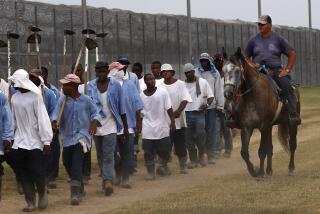Working With China While Keeping a Clear Conscience
- Share via
As the president of a leading office supplies firm headquartered in New York, I was horrified to learn recently that one of our competitors may be using a secret weapon to hold its prices down. That weapon is Chinese prison labor. In testimony before the Senate Foreign Relations Committee last month, Chinese expatriate and dissident Harry Wu, pled for a vigorous approach to the problem of laogai, the Chinese penal system in which political prisoners work under awful conditions, making products, including office supplies, for the U.S. and other foreign markets.
Many thousands of American businesses deal with China, and we should. The opening of that enormous market to the West has been good for American consumers, American business, Chinese workers and good for developing a peaceful and productive relationship between our two countries. Nevertheless, in dealing with a country that remains totalitarian in many ways, conscience must have a role, too. We are morally bound to make necessary distinctions between that country and our own, and to take sensible measures to ensure that we are not contributing to the misery of Chinese prisoners, many of whom have been jailed for offenses that here would scarcely merit space in the newspaper, let alone imprisonment.
Like Harry Wu, who was imprisoned for 19 years in a laogai camp, many of these prisoners are locked up for protesting, writing subversive essays, demonstrating on the streets and a range of other so-called counter-revolutionary activities.
I merely suggest to my competitors and friends in the business world that we do what we can to lift the burden of those who dare to exercise freedom in those dangerous circumstances. At the very least, we should not support their incarceration. One of the more obvious measures is to employ to a higher degree the principle of hands-on management with one’s Chinese associates. Travel to China, a necessity to develop and sustain business relationships, must have a watchdog dimension as well. I personally have witnessed the production of the goods I import from China from start to finish. It’s good business anyway to be on top of the process; in this particular case, it also means being able to sleep at night.
A second measure: A little healthy suspicion of our competitors is in order. If Chinese-made goods are coming in at startlingly low prices, there may just be an unseemly explanation.
Finally, I want to propose a unique partnership between the business and human rights communities that could make a significant impact on the problem and raise awareness at the same time. A certification system could be developed for all goods that originate in China, in whole or in part. Impartial inspectors trained by the Laogai Research Foundation (Wu’s organization), Human Rights Watch or any number of well-reputed rights groups would have regular access to Chinese factories and workplaces, and could seek to monitor the movement of goods into and out of prisons as well.
The reward: A copyrighted sticker, with an organizational logo, affixed to legitimately manufactured goods, reading “Not made with prison labor.” It would be worn as a badge of merit and recognized as such by people of conscience, who would in turn reward the manufacturer with their purchase.
When you look in your desk drawer, do you know if any of the products you see were produced with prison labor? And do you care enough to have your supplier vouch for their prison-labor free status?
If we do nothing, we are no better than those who willingly use prison labor in their immoral pursuit of financial gain. Choices are always available. As Americans, we have the power to exercise our options to support freedom and democracy with a simple act of conscience.
More to Read
Inside the business of entertainment
The Wide Shot brings you news, analysis and insights on everything from streaming wars to production — and what it all means for the future.
You may occasionally receive promotional content from the Los Angeles Times.










